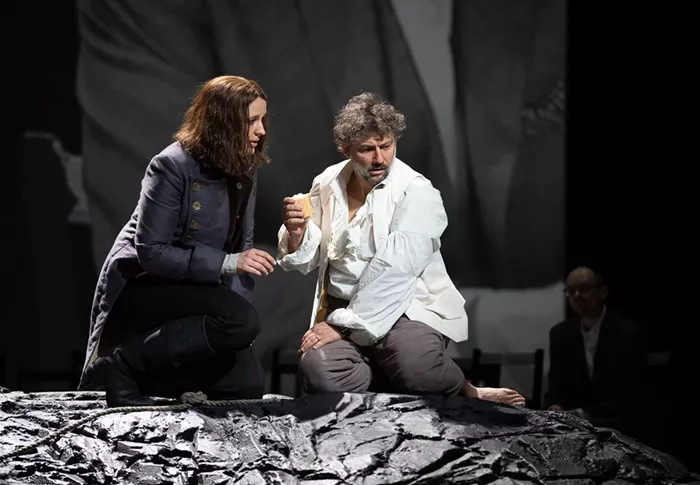Ludwig van Beethoven, widely regarded as one of the greatest composers in Western classical music, embarked on a remarkable journey with his only opera, “Fidelio.” Despite not delving extensively into opera composition like his contemporaries, Beethoven’s exploration of the genre with “Fidelio” showcases his unique musical voice and profound thematic depth. This opera stands as a testament to Beethoven’s versatility as a composer, venturing beyond symphonies and chamber music to create a work that resonates with enduring human truths.
Background and Context
The premiere of “Fidelio” in 1805 coincided with a tumultuous period in European history. The Napoleonic Wars raged on, reshaping political landscapes and igniting fervent desires for liberty and justice. Against this backdrop, Beethoven’s opera emerged as more than mere entertainment; it became a beacon of hope and a reflection of contemporary societal aspirations. The themes of freedom, heroism, and the triumph of good over evil echoed the spirit of the times, capturing the imaginations of audiences seeking solace and inspiration amidst upheaval.
Plot Synopsis
“Fidelio” unfolds with a narrative of love, sacrifice, and redemption. Leonore’s steadfast devotion to her imprisoned husband, Florestan, drives the plot forward as she assumes the guise of Fidelio, a young man hired at the prison where Florestan is unjustly held. The opera’s tension escalates as Leonore navigates the dangers of deception and confronts the tyrannical Governor Pizarro to secure Florestan’s freedom. Through dramatic twists and poignant moments of revelation, “Fidelio” explores the depths of human resilience and the enduring power of love.
Musical Analysis
Beethoven’s musical genius shines through in “Fidelio,” evident in his innovative use of motifs, harmonic progression, and orchestration. The “Leonore Overture No. 3,” a standalone masterpiece often performed in concert settings, encapsulates the opera’s essence with its dramatic shifts, expressive themes, and triumphant finale. Beethoven’s fusion of melodic beauty, structural complexity, and emotional depth elevates “Fidelio” to a pinnacle of operatic artistry, inviting listeners into a world of passion and intrigue.
The Themes of Freedom and Justice
Central to “Fidelio” are its themes of freedom, justice, and the human quest for truth and dignity. Leonore’s courageous actions symbolize the indomitable spirit of individuals fighting against oppression and injustice. Beethoven’s music becomes a powerful vehicle for conveying these themes, evoking a range of emotions from hope and defiance to sorrow and eventual triumph. In an era marked by social and political upheaval, “Fidelio” resonated deeply with audiences grappling with issues of personal and collective liberty.
Critical Reception and Evolution
The initial reception of “Fidelio” was mixed, with criticisms directed at its libretto and structural complexities. Beethoven himself made revisions to the opera, refining its narrative flow and musical coherence. Subsequent performances and adaptations further enhanced its reputation, solidifying “Fidelio” as a cornerstone of the operatic repertoire. Modern interpretations and stage productions continue to breathe new life into Beethoven’s vision, highlighting the enduring relevance and adaptability of “Fidelio” for contemporary audiences.
Performance History
“Fidelio” has a storied performance history that reflects its enduring appeal and artistic significance. Despite facing challenges during its initial premiere in 1805, including changes to the libretto and music, subsequent revisions and revivals contributed to its growing acclaim. Notable performances in the 19th and 20th centuries, including interpretations by renowned conductors and opera houses, solidified “Fidelio” as a cornerstone of the operatic repertoire. Modern productions continue to showcase its relevance and adaptability, with innovative stagings and interpretations bringing new dimensions to Beethoven’s vision. From its early struggles to its current status as a beloved opera, “Fidelio” remains a testament to Beethoven’s musical genius and the enduring power of its themes to resonate with audiences worldwide.
Legacy and Influence
Beyond its artistic merits, “Fidelio” leaves a lasting legacy that extends far beyond the realm of opera. Its themes of love, sacrifice, and the pursuit of justice have resonated across generations, inspiring artists, activists, and audiences worldwide. The opera’s enduring message of hope and human resilience serves as a timeless reminder of the transformative power of art and the enduring quest for freedom and dignity.
Conclusion
In conclusion, Beethoven’s “Fidelio” stands as a crowning achievement in the realm of opera, showcasing the composer’s unparalleled ability to marry music and meaning. Its rich tapestry of themes, from love and heroism to justice and redemption, continues to captivate and move audiences centuries after its premiere. As we navigate the complexities of our own times, “Fidelio” remains a beacon of artistic excellence and a testament to the enduring power of music to illuminate the human experience.

